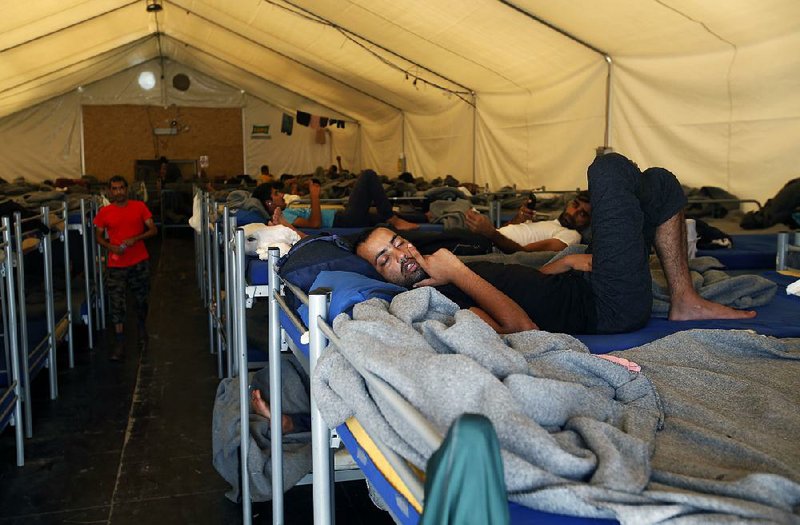SID, Serbia -- For Mohammad Ansar Al Mansouri, reaching the European Union has proved to be an impossible task. In the past two months, the 28-year-old from Pakistan has tried numerous times to cross from EU candidate Serbia into EU member states Hungary or Croatia but was always chased back by police guarding their borders.
Now countries across eastern and central Europe -- spurred by Hungary's tough stance against refugees and migrants trying to cross into the country -- are teaming up to make it even harder for people like Al Mansouri to enter the EU.
When the nations along the former Balkan migrant route -- leading from Turkey through Greece, Macedonia, Serbia, Croatia and Slovenia -- closed their borders one after another in March, it reduced the influx of people from thousands to hundreds a day.
But despite this, and an EU-Turkey deal aimed at keeping migrants away from Europe, they have continued pouring in using clandestine routes.
Now governments are looking for ways to fortify their borders further, fearing the number of people from the Middle East, Asia or Africa trying to cross the Balkans could swell again as worsening weather discourages them from using the Mediterranean Sea crossing from Libya to Italy.
In past weeks, Hungary's anti-migrant prime minister has offered to send police to help Serbia guard its borders and has announced plans to build another barbed-wire fence on Hungary's southern border. Serbia, too, is considering border barriers toward Macedonia and Bulgaria, where it has already beefed up army and police patrols. Further west, Croatia and Slovenia are also gearing up for a possible migrant wave. In Brussels, the EU has urged reinforcements on Bulgaria's border to Turkey to manage the influx.
Migration is on the agenda of the EU summit in Bratislava, Slovakia, with nations divided over how to deal with the crisis after more than 1 million people entered Europe last year.
"I am against walls and fences," Serbia's Prime Minister Aleksandar Vucic said. "We just want a solution. Serbia cannot be the first and last defense of Europe. Europe must solve this on the borders of Greece and Bulgaria."
Experts have warned that further tightening of anti-migrant measures only adds to the hardship for migrants and refugees and risks pushing even more of them into the hands of people smugglers. Thousands more could get stranded in Balkan countries such as Serbia, where frustration is already mounting.
"It is a vicious circle that will not result in a solution," said Rados Djurovic from the Asylum Protection Center in Serbia. "If you bring army and police to the border, those people may not pass today, but they will pass tomorrow or the day after."
"They have no other alternative, whether they are fleeing war or poverty," he added.
The European Union's border agency, Frontex, has reported that the number of migrants arriving in the Greek islands from Turkey has increased significantly over the last month, with 3,430 migrants "detected" in August, up from 2,030 in July. Frontex has described the rise as the "first noticeable monthly increase" since the EU-Turkey migrant deal came into effect and Macedonia tightened border controls with Greece.
Serbian officials have said that already some 5,000 migrants are staying in the country, which has capacities for only 1,000 more.
With more migrants arriving than leaving Serbia, there are fears that thousands more could soon pile up.
Officials have also complained that most of the migrants are young, single men from Afghanistan, Pakistan or north Africa and so-called economic migrants, whose asylum requests are routinely rejected in EU countries and whom nobody wants to take in.
Al Mansouri has been on the road for the past six months and has been stuck in Serbia for the last two.
He has moved among three asylum centers in Serbia, and made numerous attempts -- legal and illegal -- to enter the EU, all in vain.
A policeman back in Pakistan, Al Mansouri says he fled because he faced threats to his life.
"I am running from country to country ... seeking a safe life," Al Mansouri said in English. "They won't give us papers to work or to live, they just want us to leave the country; it is same from Turkey to Greece, Macedonia and Serbia. It is the same everywhere."
Al Mansouri is staying in a Serbian asylum center in Sid -- a town of some 15,000 people on the border with Croatia -- where he is sharing a stuffy tent with dozens of other migrants like him.
Stranded, the men already have spent much of their money and now spend their days lingering in the camps, with no prospects ahead.
"We went through hell and we are stuck here," Al Mansouri said. "We can't go back, we can't go forward, so we ask the EU, where do we go now?"
Information for this article was contributed by Dusan Stojanovic of The Associated Press.
A Section on 09/17/2016


